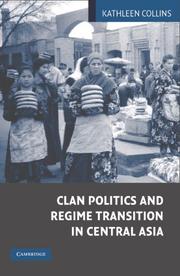| Listing 1 - 9 of 9 |
Sort by
|
Book
ISBN: 9781441103192 9780826429308 Year: 2009 Publisher: New York, N.Y. Continuum
Abstract | Keywords | Export | Availability | Bookmark
 Loading...
Loading...Choose an application
- Reference Manager
- EndNote
- RefWorks (Direct export to RefWorks)
Mass communications --- Sociology of culture --- United States --- United States of America

ISBN: 0521839505 9780521839501 9780521114660 9780511510014 0511274416 9780511274411 9780511275111 0511275110 0511272790 9780511272790 0511510012 1280815353 9781280815355 9786610815357 6610815356 1107162521 9781107162525 0511320809 9780511320804 0511273584 9780511273582 0521114667 Year: 2006 Publisher: Cambridge Cambridge University Press
Abstract | Keywords | Export | Availability | Bookmark
 Loading...
Loading...Choose an application
- Reference Manager
- EndNote
- RefWorks (Direct export to RefWorks)
This book is a study of the role of clan networks in Central Asia from the early twentieth century through 2004. Exploring the social, economic, and historical roots of clans, and their political role and political transformation in the Soviet and post-Soviet periods, it argues that clans are informal political actors that are critical to understanding politics in this region. The book demonstrates that the Soviet system was far less successful in transforming and controlling Central Asian society, and in its policy of eradicating clan identities, than has often been assumed. In order to understand Central Asian politics and their economies, scholars and policy makers must take into account the powerful role of these informal groups, how they adapt and change over time, and how they may constrain or undermine democratization in this strategic region.
Clans --- Asia, Central --- Soviet Union --- Asie centrale --- URSS --- Social conditions --- Politics and government --- Relations --- History. --- Conditions sociales --- Politique et gouvernement --- Histoire --- Clans and clan system --- Sibs --- Families --- Kinship --- Tribes --- Central Asia --- Soviet Central Asia --- Tūrān --- Turkestan --- West Turkestan --- Asia --- History --- #SBIB:328H263 --- #SBIB:328H26 --- #SBIB:94H6 --- Instellingen en beleid: andere GOS-staten --- Instellingen en beleid: USSR (actuele geschiedenis van de USSR: tot 1989) --- Geschiedenis van Rusland en de landen van de USSR --- Советский Союз --- Ber. ha-M. --- Związek Socjalistycznych Republik Radzieckich --- ZSRR --- Związek Socjalistycznych Republik Sowieckich --- ZSRS --- Szovjetunió --- TSRS --- Tarybų Socialistinių Respublikų Sąjunga --- SRSR --- Soi︠u︡z Radi︠a︡nsʹkykh Sot︠s︡ialistychnykh Respublik --- SSSR --- Soi︠u︡z Sovetskikh Sot︠s︡ialisticheskikh Respublik --- UdSSR --- Shūravī --- Ittiḥād-i Jamāhīr-i Ishtirākīyah-i Shūrāʼīyah --- Russia (1923- U.S.S.R.) --- Sovetskiy Soyuz --- Soyuz SSR --- Sovetskiĭ Soi︠u︡z --- Soi︠u︡z SSR --- Uni Sovjet --- Union of Soviet Socialist Republics --- USSR --- SSṚM --- Sovetakan Sotsʻialistakan Ṛespublikaneri Miutʻyun --- SSHM --- Sovetakan Sotsʻialistakan Hanrapetutʻyunneri Miutʻyun --- Unión de Repúblicas Socialistas Soviéticas --- Berit ha-Moʻatsot --- Rusyah --- Ittiḥād al-Sūfiyītī --- Rusiyah --- Rusland --- Soṿet-Rusland --- Uni Soviet --- Union soviétique --- Zȯvlȯlt Kholboot Uls --- Związek Radziecki --- ESSD --- Sahaphāp Sōwīat --- KhSHM --- SSR Kavširi --- Russland --- SNTL --- PSRS --- Su-lien --- Sobhieṭ Ẏuniẏana --- FSSR --- Unione Sovietica --- Ittiḥād-i Shūravī --- Soviyat Yūniyan --- Russian S.F.S.R. --- Social Sciences --- Political Science --- Clans - Asia, Central --- Asia, Central - Social conditions - 1917-1991 --- Asia, Central - Social conditions - 1991 --- -Asia, Central - Politics and government - 1991 --- -Soviet Union - Relations - Asia, Central --- Asia, Central - Relations - Soviet Union --- Asia, Central - History
Book
ISBN: 0197685102 0197685080 Year: 2023 Publisher: New York, NY : Oxford University Press,
Abstract | Keywords | Export | Availability | Bookmark
 Loading...
Loading...Choose an application
- Reference Manager
- EndNote
- RefWorks (Direct export to RefWorks)
In 'Politicizing Islam', Kathleen Collins explores the causes, dynamics, and variation in Islamist movements - first within the USSR, and then in the post-Soviet states of Tajikistan, Uzbekistan, and Kyrgyzstan. Drawing upon extensive ethnographic and historical research on Islamist mobilization across numerous post-Soviet Central Asian countries, she covers over a century and explains the strategies and relative success of each movement. Collins argues that in each case, state repression of Islam and ideology motivated and enabled Islamist mobilization.
Muslims --- Islam --- Islam and politics --- Politics and government. --- History. --- Asia, Central --- Mohammedans --- Moors (People) --- Moslems --- Muhammadans --- Musalmans --- Mussalmans --- Mussulmans --- Mussulmen --- Religious adherents --- Religion. --- Religion & beliefs. --- Soviet Union
Digital
ISBN: 9781442268708 1442268700 Year: 2016 Publisher: Lanham Rowman & Littlefield
Abstract | Keywords | Export | Availability | Bookmark
 Loading...
Loading...Choose an application
- Reference Manager
- EndNote
- RefWorks (Direct export to RefWorks)
This is the first book to examine the life and career of Dr. Joyce Brothers, a nearly ubiquitous figure who appeared on television from the mid-1950s (as a contestant on The 64,000 Question) through the twenty-first century. Known primarily for her insight as a psychologist, Brothers wrote a daily newspaper advice column for more than five decades until her death in 2013. The author situates Dr. Brothers within the context of the broader American culture, incorporating relevant social, cultural, and historical events into this biographical narrative.

ISBN: 0910331014 Year: 1990 Publisher: Troy Amorphous institute press
Abstract | Keywords | Export | Availability | Bookmark
 Loading...
Loading...Choose an application
- Reference Manager
- EndNote
- RefWorks (Direct export to RefWorks)
Photography --- History
Book
ISBN: 1607522993 Year: 2010 Publisher: Charlotte, North Carolina : Information Age Publishing, Inc.,
Abstract | Keywords | Export | Availability | Bookmark
 Loading...
Loading...Choose an application
- Reference Manager
- EndNote
- RefWorks (Direct export to RefWorks)
Students --- Stress (Psychology) --- Education --- Psychology --- Educational psychology --- Mental health --- Research. --- Research. --- Research --- Methodology. --- Research --- Methodology. --- Research --- Methodology.
Book
ISBN: 1433807157 Year: 2010 Publisher: Washington, District of Columbia : American Psychological Association,
Abstract | Keywords | Export | Availability | Bookmark
 Loading...
Loading...Choose an application
- Reference Manager
- EndNote
- RefWorks (Direct export to RefWorks)
Gifted children --- Gifted children --- Research. --- Ability testing.
Book
Year: 2018 Publisher: [Boston, Mass.] : University of Massachusetts Boston,
Abstract | Keywords | Export | Availability | Bookmark
 Loading...
Loading...Choose an application
- Reference Manager
- EndNote
- RefWorks (Direct export to RefWorks)
Sexual minorities --- Written communication --- Heterosexism --- Mental health. --- Therapeutic use. --- Psychological aspects.
Book

ISBN: 9781685855239 1685855237 Year: 2023 Publisher: Boulder
Abstract | Keywords | Export | Availability | Bookmark
 Loading...
Loading...Choose an application
- Reference Manager
- EndNote
- RefWorks (Direct export to RefWorks)
How can the United Nations, regional and subregional organizations, government donors, and other policymakers best apply the tools of conflict prevention to the wide range of intrastate conflict situations actually found in the field? The detailed case studies and analytical chapters in From Promise to Practice offer operational lessons for fashioning strategy and tactics to meet the challenges of specific conflicts, both potential and actual.
| Listing 1 - 9 of 9 |
Sort by
|

 Search
Search Feedback
Feedback About UniCat
About UniCat  Help
Help News
News